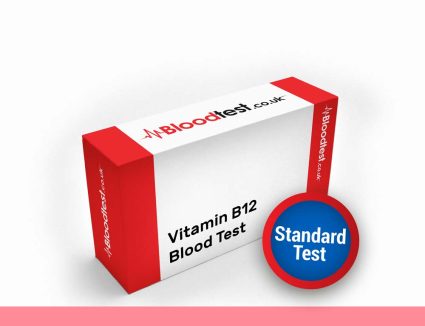Understanding the Importance of Your Vitamin B12 Blood Test for Optimal Health
Key Reasons to Prioritise a Vitamin B12 Blood Test for Your Well-Being

A vitamin B12 blood test in Ramsgate serves as an essential diagnostic measure to assess the levels of vitamin B12 present within your bloodstream. This vital nutrient significantly influences numerous physiological functions, such as the production of red blood cells, the preservation of nerve function, and the synthesis of DNA. Gaining insight into your B12 levels can reveal crucial information about your health status, especially if you are encountering symptoms indicative of a deficiency, such as fatigue or cognitive decline. By comprehensively understanding your B12 status, you can make informed decisions to enhance your overall well-being.
The role of vitamin B12 extends to a multitude of metabolic processes within the body. Conducting a thorough assessment of this indispensable nutrient enables healthcare professionals to identify potential deficiencies, which, if neglected, can lead to severe health issues, including anemia, cognitive impairment, and various neurological disorders. Thus, this blood test acts as a foundational diagnostic tool for recognizing these concerns, facilitating timely interventions and tailored treatment strategies that can substantially improve patient health outcomes.
Interested in a Quick Audio Overview?
 Identifying Individuals Who Should Consider Testing for Vitamin B12 Deficiency
Identifying Individuals Who Should Consider Testing for Vitamin B12 Deficiency
Individuals exhibiting symptoms, including fatigue, weakness, or neurological disturbances, should strongly consider undergoing a vitamin B12 blood test in Ramsgate. This recommendation is particularly vital for those possessing known risk factors, such as seniors, vegans, and individuals with gastrointestinal disorders. Given that vitamin B12 is predominantly sourced from animal products, those adhering to plant-based diets may encounter challenges in maintaining sufficient levels of this crucial nutrient.
The manifestations of B12 deficiency can often be subtle and may be easily mistaken for general fatigue or stress. However, disregarding these signs can lead to more severe health complications over time. Regular monitoring of B12 levels is especially critical for individuals with a history of malabsorption syndromes or those on medications that could interfere with B12 absorption. Being cognisant of these factors and actively seeking testing can play a pivotal role in averting potential health issues.
A Step-by-Step Overview of the Vitamin B12 Blood Testing Procedure
The process of conducting a vitamin B12 blood test in Ramsgate is both straightforward and minimally invasive. It generally entails drawing a small blood sample from a vein in the arm, a procedure that typically takes less than 10 minutes. This convenience is particularly advantageous for individuals with busy lives who may struggle to find time for medical appointments.
Before the test, healthcare providers may provide specific guidelines, possibly including fasting requirements, to ensure accurate results. Following the collection of the blood sample, it is dispatched to a laboratory for thorough analysis. Results are typically available within a few days, allowing patients and healthcare providers to make informed decisions based on the findings.
Understanding What Constitutes Normal Vitamin B12 Levels

Normal vitamin B12 levels typically range from 200 to 900 picograms per millilitre. However, it is essential to recognise that reference ranges may vary slightly among different laboratories, underscoring the importance of consulting with a healthcare professional regarding your specific results. Understanding where your B12 levels fall within this spectrum can yield valuable insights into your overall health and well-being.
A result that falls below the established standard range may indicate a deficiency, prompting further exploration and possible treatment options. Moreover, even individuals who score within the normal range might still experience symptoms if their levels are situated on the lower end of that spectrum. Therefore, discussing your test results with a healthcare provider is crucial to determine if further action or interventions are warranted.
How to Effectively Interpret Your Vitamin B12 Test Results
Thorough interpretation of results from a vitamin B12 blood test in Ramsgate is vital. If the results indicate levels beneath the standard range, this typically signifies a deficiency that may necessitate more in-depth medical evaluation. Healthcare professionals may recommend follow-up tests, such as measuring methylmalonic acid (MMA) levels or homocysteine tests, to ascertain the underlying cause of the deficiency.
On the other hand, results indicating elevated B12 levels, while less common, can also raise concerns. High levels may be associated with specific medical conditions or excessive supplementation. Understanding the context of these findings is essential for developing a comprehensive, personalised treatment plan that effectively addresses individual health requirements.
The Vital Role of Vitamin B12 in Maintaining Human Health
Diving into the Diverse Functions of Vitamin B12 Within the Body

Vitamin B12 is a critical nutrient that plays a fundamental role in numerous physiological processes within the human body. One of its primary functions is facilitating the formation of red blood cells, essential for the efficient transport of oxygen throughout the body. A deficiency in B12 can disrupt this vital process, leading to anemia, characterised by fatigue and weakness due to inadequate oxygen delivery to tissues.
In addition to its role in erythropoiesis, vitamin B12 is indispensable for preserving neurological health. It aids in the production of myelin, the protective sheath that surrounds nerves, ensuring effective communication between the brain and the rest of the body. Consequently, individuals with inadequate B12 levels may experience neurological symptoms, including numbness, tingling sensations, or cognitive difficulties.
Furthermore, vitamin B12 is crucial for the process of DNA synthesis, influencing cell division and overall health. The diverse functions of this essential nutrient underscore the necessity of maintaining adequate levels to support a healthy and well-functioning body.
Identifying the Symptoms of Vitamin B12 Deficiency
The symptoms of vitamin B12 deficiency can vary significantly and may lead to severe health complications if not addressed promptly. Common manifestations include fatigue, weakness, and pallor, which arise from the nutrient’s essential role in red blood cell production. As the deficiency progresses, individuals may also encounter neurological symptoms, such as numbness, tingling in the extremities, and difficulties with balance and coordination.
Cognitive impairments are another significant concern, as insufficient levels of B12 can adversely affect memory and concentration. In severe cases, prolonged deficiency can result in irreversible neurological damage, highlighting the importance of early detection through a vitamin B12 blood test in Ramsgate.
Moreover, individuals with a history of gastrointestinal disorders or those who have undergone surgeries that impact nutrient absorption are at an increased risk for deficiency. Recognising these symptoms and understanding their implications can motivate individuals to seek testing and appropriate treatment sooner rather than later.
Identifying Dietary Sources of Vitamin B12
Vitamin B12 is naturally abundant in a variety of animal products, making it challenging for those adhering to vegan or vegetarian diets to achieve sufficient levels. Rich sources of B12 include meat, fish, dairy products, and eggs. For example, fish such as salmon and tuna not only serve as excellent sources of B12 but also provide additional health benefits through their omega-3 fatty acids.
For individuals who do not consume animal products, fortified foods become an essential alternative. Many breakfast cereals, plant-based milk alternatives, and nutritional yeast are fortified with B12, offering viable options for maintaining adequate nutrient levels. Additionally, B12 supplements are widely available and can be particularly beneficial for those at risk of deficiency, ensuring they receive sufficient amounts of this crucial nutrient.
Education regarding dietary sources of B12 is paramount, as individuals must make informed choices to support optimal health. Understanding how to incorporate B12-rich foods into one’s daily diet can significantly influence overall well-being.
Grasping the Recommended Daily Intake of Vitamin B12
The recommended daily intake of vitamin B12 varies based on age and specific conditions. For most adults, the daily requirement is established at 2.4 micrograms. However, pregnant and breastfeeding women typically require higher amounts to support both their health and that of their developing child.
Understanding these recommendations is crucial for maintaining optimal health. For instance, older adults may have altered absorption capabilities and may require higher intake levels to avert deficiency. Furthermore, individuals with dietary restrictions must remain vigilant in ensuring they meet their daily needs through fortified foods or supplements.
Regular consultations with healthcare providers can assist individuals in determining their specific requirements based on lifestyle, dietary habits, and overall health status. Striking a balance in vitamin intake is essential to avoid both deficiency and excess.
Key Steps to Prepare for Your Vitamin B12 Test in Ramsgate
Crucial Pre-Test Guidelines for Accurate Vitamin B12 Testing
Preparing for a vitamin B12 blood test in Ramsgate entails understanding the necessary pre-test instructions to ensure precise results. While fasting is generally not required for this specific test, some healthcare providers may recommend it, particularly if additional blood tests are being conducted concurrently. Consulting with your healthcare provider will clarify tailored instructions that suit your individual circumstances.
It is also imperative to disclose any medications or supplements you may be taking, as these can influence your B12 levels. Certain medications, notably those prescribed for gastrointestinal conditions, can impact absorption and lead to misleading results. Being transparent with your healthcare provider ensures that the test results will be interpreted accurately.
Moreover, maintaining a consistent diet in the days leading up to the test can yield more reliable results. Sudden dietary changes may skew the findings, making it advisable to adhere to your regular eating habits prior to the test.
What to Expect During the Blood Testing Experience
When undergoing a vitamin B12 blood test in Ramsgate, patients can expect a swift and uncomplicated experience. The test typically lasts under 10 minutes, during which a healthcare professional will draw a small blood sample from a vein in the arm. Most patients report minimal discomfort, often described as a brief sensation akin to a quick pinch.
The testing environment is generally calm and professional, helping to alleviate any anxiety for those who may feel apprehensive about blood tests. After the blood draw, the sample is sent to a laboratory for analysis. Patients will typically be informed about when to expect their results, often within a few days, providing a clear timeline for follow-up discussions.
Having a solid understanding of what to expect can enhance the overall experience, allowing patients to feel more at ease during the testing process.
Post-Test Care Tips and Recommendations Following Your Vitamin B12 Test
After completing a vitamin B12 blood test in Ramsgate, patients are encouraged to follow specific post-test care instructions to minimise potential discomfort or bruising at the blood draw site. Applying gentle pressure to the site immediately after the blood draw can help reduce bleeding, a suggestion typically made by healthcare providers.
Keeping the arm elevated for a brief period can further promote blood flow and decrease the likelihood of bruising. While complications are rare, if severe pain or excessive bleeding occurs, it’s essential to contact your healthcare provider for immediate guidance.
Most individuals can return to their regular activities shortly after the test, as it is a minimally invasive procedure. However, staying well-hydrated is advisable, as this can support recovery and may facilitate better blood circulation.
Locating Testing Services Available in Ramsgate
Discovering Local Clinics Offering Vitamin B12 Blood Testing Services
Ramsgate boasts several local clinics that provide vitamin B12 blood testing services. Many of these clinics have streamlined access to essential health services without the need for extensive travel. Choosing a local clinic often results in shorter wait times and personalised care, as many are equipped to deliver comprehensive health services tailored to individual needs.
Patients should seek out clinics that have established a strong reputation for quality healthcare. Checking online reviews and ratings can provide valuable insights into the level of service one can anticipate. Additionally, it’s advisable to contact the clinic directly to inquire about their specific testing protocols and any prerequisites required before the test.
By opting for local services, residents can ensure they remain proactive about their health without the inconvenience of long-distance travel.
Utilising Hospital Facilities for Comprehensive Vitamin B12 Testing
Ramsgate General Hospital offers an extensive array of blood testing facilities, including vitamin B12 testing. As a central healthcare institution in the area, the hospital is equipped with advanced diagnostic tools and experienced staff, ensuring that patients receive accurate and timely results.
Patients can expect a streamlined process, beginning with consultations to understand their specific health needs. The hospital setting enables thorough examination and interpretation of test results, with specialists available to discuss any concerns or recommend further steps as necessary.
For individuals requiring additional testing or those with more complex health issues, the hospital can offer a coordinated approach to care, incorporating various specialists. This holistic method promotes better health outcomes and ensures that any deficiencies are comprehensively addressed.
Exploring the Advantages of Private Testing Services
For those seeking more immediate results, private laboratories in Ramsgate offer convenient and often expedited vitamin B12 blood testing services. These facilities typically provide a broad range of testing options with flexible scheduling, allowing individuals to select times that align with their busy lifestyles.
Private testing can significantly reduce waiting times for results, often delivering findings within 24 hours. This speed can be crucial for patients eager to understand their health status and discuss potential treatment options with their healthcare providers without delay.
Although private testing typically incurs a fee, many individuals find that the benefits of rapid results and personalised service justify the cost. It is essential to research various private testing options to find one that aligns with your needs and budget.
Mobile Testing Services: A Convenient Option for Vitamin B12 Testing
Mobile testing services have emerged as a practical solution for residents in Ramsgate seeking vitamin B12 blood testing. These services offer the flexibility of having tests conducted at home or a location of the patient’s choice, accommodating those with mobility challenges or busy schedules.
Mobile units are staffed with qualified healthcare professionals who adhere to strict safety protocols. Patients can expect the same level of care and professionalism they would receive in a clinic or hospital setting.
The convenience of mobile testing enables timely diagnosis and intervention, especially for individuals who may be reluctant to visit a healthcare facility in person. This approach can significantly enhance access to essential health services and foster a proactive attitude towards health management.
Mastering the Interpretation of Your Blood Test Findings
Understanding the Normal Range for Vitamin B12 Levels
Interpreting the results from a vitamin B12 blood test in Ramsgate necessitates an understanding of the normal range, which typically lies between 200 and 900 picograms per millilitre. It is crucial to remember that these values may vary slightly depending on the laboratory performing the analysis.
Patients should not solely rely on numerical results; contextual factors, such as symptoms and dietary habits, should also be taken into account. For instance, an individual within the normal range may still experience the effects of a B12 deficiency if they are positioned at the lower end of the normal scale.
Additionally, understanding one’s baseline levels can assist in monitoring changes over time, particularly for individuals at risk of deficiency due to dietary restrictions or health conditions. Regular testing and monitoring can ensure that any fluctuations in B12 levels are promptly addressed.
Recognising the Implications of Low B12 Levels
When test results indicate low vitamin B12 levels, further investigation is often warranted. A vitamin B12 blood test in Ramsgate revealing results below the normal range typically signifies a deficiency, which can have significant implications for overall health.
Low B12 levels can arise from various factors, including dietary deficiencies, malabsorption issues, or certain medical conditions that affect nutrient absorption. Patients with low levels should consult their healthcare provider to explore potential underlying causes and appropriate treatment options.
In many instances, treatment may involve dietary adjustments, such as increasing the intake of B12-rich foods or incorporating fortified products. Supplements or B12 injections may be essential for those with severe deficiencies, particularly if malabsorption is a concern.
Understanding the Risks Associated with Elevated B12 Levels
While less common, elevated vitamin B12 levels can also raise concerns. A vitamin B12 blood test in Ramsgate yielding high results may not necessarily indicate a deficiency; rather, it could suggest an underlying medical condition or excessive supplementation.
Conditions such as liver disease or specific types of leukaemia can lead to elevated B12 levels, making it essential for patients to engage in thorough discussions regarding their results with their healthcare provider. Understanding the context of high B12 levels is critical for developing a tailored health management plan.
For individuals taking supplements, it may be necessary to reassess their dosage to avoid excessive intake. Regular testing can help monitor B12 levels, ensuring they remain within an optimal range for health.
Post-Test Actions: Essential Next Steps Following Your Vitamin B12 Testing
Engaging with Your Healthcare Provider for a Comprehensive Understanding
After receiving the results of a vitamin B12 blood test in Ramsgate, it is vital to consult with your GP to comprehend the significance of the findings for your health. Engaging in a thorough discussion about your results allows for a better understanding of any potential deficiencies and their implications for your overall well-being.
Your healthcare provider can offer insights into the next steps based on your results, including lifestyle modifications, dietary adjustments, or additional testing as required. This conversation is crucial for tailoring a health plan that meets your unique needs and goals.
In instances where deficiencies are identified, discussing symptoms and any changes in your health can lead to a more comprehensive evaluation and a proactive approach to treatment.
Exploring Treatment Strategies Tailored to Vitamin B12 Deficiency
The treatment options available for vitamin B12 deficiency identified through a vitamin B12 blood test in Ramsgate can vary significantly depending on the severity of the deficiency. In cases of mild deficiency, dietary adjustments may suffice to address the issue. This can involve increasing the consumption of B12-rich foods, such as meat, fish, dairy products, and eggs, or incorporating fortified foods into your daily diet.
For individuals with more pronounced deficiencies, healthcare providers may recommend B12 supplements or injections. Injections can be particularly beneficial for those with malabsorption issues, as they bypass the digestive system entirely, ensuring adequate absorption of the nutrient.
It is essential to adhere closely to your healthcare provider’s recommendations and attend follow-up appointments to monitor your B12 levels. Regular testing can help ensure that treatment remains effective and that levels stay within the optimal range.
Monitoring Your Vitamin B12 Levels Over Time
Regular testing is crucial for those at risk of vitamin B12 deficiency, especially following an initial vitamin B12 blood test in Ramsgate that indicates low levels. Monitoring your B12 levels allows for timely adjustments to your health plan, ensuring that deficiencies do not persist or worsen.
Individuals with dietary restrictions, malabsorption issues, or specific health conditions may want to consider more frequent testing. This vigilance helps identify fluctuations in B12 levels, enabling proactive management of overall health.
Consulting with your healthcare provider regarding the appropriate testing frequency based on your circumstances can provide peace of mind and support ongoing health and wellness.
Incorporating Vitamin B12 into Your Daily Lifestyle
Making Informed Dietary Choices to Sustain Optimal B12 Levels
Maintaining adequate vitamin B12 levels requires making informed dietary choices that support long-term health. A balanced diet that incorporates a variety of B12-rich foods is essential to achieving this goal. Consuming animal products, such as lean meats, fish, eggs, and dairy, can help ensure optimal intake of this vital nutrient.
For individuals adhering to vegetarian or vegan diets, focusing on fortified foods is critical. Many cereals, plant-based milk options, and nutritional yeast are fortified with B12, providing necessary alternatives for those unable to obtain sufficient levels through diet alone. Supplements can also be an effective solution for individuals facing dietary restrictions.
Education on dietary sources of vitamin B12 empowers individuals to make informed choices that positively impact their health. Understanding how to read labels and identify fortified foods can significantly enhance overall wellness and prevent deficiencies.
Utilising Supplements as a Strategy to Enhance Your Vitamin B12 Intake
Vitamin B12 supplements provide a practical solution for individuals at risk of deficiency or those unable to obtain sufficient amounts through their diet. These supplements are available in various forms, including tablets, sublingual formulations, and injections, offering flexibility tailored to individual preferences and needs.
When considering supplementation, it is crucial to consult with a healthcare provider to determine the appropriate dosage and form of supplementation. Regular monitoring of B12 levels can help ensure that supplementation effectively addresses any deficiencies while preventing excessive intake.
Incorporating B12 supplements into one’s routine can significantly benefit overall health, particularly for individuals with specific dietary restrictions or absorption issues. By prioritising B12 intake, individuals can effectively support their health and well-being.
Addressing Common Questions About Vitamin B12 Testing
What does a vitamin B12 blood test measure?
A vitamin B12 blood test measures the levels of vitamin B12 in your blood, assisting in evaluating whether you possess sufficient amounts for your body’s needs.
Why might I need a vitamin B12 blood test?
Individuals experiencing symptoms such as fatigue, weakness, or neurological issues may require testing to ascertain if a deficiency exists and to address any health concerns.
How is the vitamin B12 test conducted?
A small blood sample is taken from a vein in your arm and sent for analysis, with the entire process typically taking less than 10 minutes.
What constitutes normal vitamin B12 levels?
Normal levels generally range from 200 to 900 picograms per millilitre, but this can vary slightly based on the laboratory performing the test.
What does it imply if my vitamin B12 levels are low?
Low levels may indicate a deficiency, necessitating further evaluation and possible treatment options, such as dietary changes or supplements.
Can high levels of vitamin B12 be dangerous?
High levels can indicate medical conditions or excessive supplementation, so consulting with a healthcare provider for proper interpretation and guidance is essential.
How should I prepare for the test?
Fasting is usually not required; however, it is recommended to consult your healthcare provider for any specific instructions tailored to your situation.
Where can I have a vitamin B12 test done in Ramsgate?
You can get tested at local clinics, Ramsgate General Hospital, private labs, or through mobile testing services for your convenience.
What should I do after receiving my test results?
Discuss your results with your healthcare provider to understand their implications and determine appropriate next steps for your health.
How often should I have my vitamin B12 levels checked?
Individuals at risk of deficiency should consult their healthcare provider to determine the appropriate frequency of testing to maintain optimal levels.
Connect with us on Facebook!
This Article Was First Found On https://bloodtest.co.uk
The Article Vitamin B12 Blood Test: Your Essential Guide in Ramsgate Was Found On https://limitsofstrategy.com

